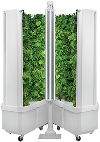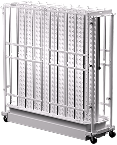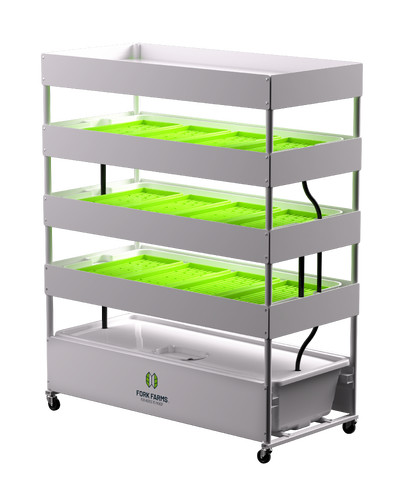Are Indoor Hydroponic Gardens Worth It?
From a renewed interest in plant-based diets to innovative organic seeds, there’s never been a better time to strike up an interest in farming. Growing your fruit, vegetables, and herbs can be extremely rewarding, offering a chance to save money on groceries, try out new foods, make a positive life change, or experiment with a new hobby. Beyond sustainable fresh food production, these indoor gardens can also provide community engagement, job and skill training, educational opportunities, growth in local economies, and more. Healthcare and community health professionals can also use indoor farming to turn all kinds of settings into fresh and engaging sources of nourishment.
What are Indoor Hydroponic Gardens?
Indoor hydroponic gardens are simply a method of growing plants without using soil. These systems use water, nutrients, and light to sustain growth and can be as small as a tabletop unit or as large as a table or shelf. As indoor hydroponics can come in multiple sizes and do not rely on outdoor elements, they suit spaces in any climate. Whether you’re just starting your hydroponics journey or looking to level up your current efforts, this article outlines how hydroponic gardens work and the potential for these resources.
Are Indoor Hydroponic Gardens Worth It?
Hydroponics provides year-round growth and cultivation, and with the right hydroponics system, you can grow 25+ lbs of fresh food every 28 days. The growth rates of crops from indoor hydroponic gardens are also typically faster, as they don’t rely on the temperament and unpredictability of the outdoors. This can lead to long-term reduced food costs, improved nutritional value, and overall improved food safety for yourself and your family.
For many countries, this is why hydroponic gardens are considered the future of farming and sustainability. From revolutionizing agriculture in the Caribbean to expanding the growing season in Alaska, indoor hydroponic gardens can fulfill several needs for communities worldwide.
Hydroponics: The Benefits
There are many benefits to indoor hydroponic gardens. Growing your produce is not only healthier, it’s cost-effective, efficient, and convenient. Using less water than traditional farming, it’s environmentally friendly and a good solution for environments with water shortages.
It's also great for school districts, corporations, nonprofits, and families living in areas without access to local produce and goods or living in harsh climates. It’s truly an excellent activity for anyone looking to the future and wanting to learn how to garden and grow fresh plants and produce.
Whether you are a high school teacher in New York City or a food service professional in Phoenix, you can use indoor hydroponic gardens to reliably grow fresh and healthy plants and produce.
Hydroponics: Common Misconceptions
There are a lot of common misconceptions about hydroponics regarding price, knowledge, time investment, and space. First, while some systems may be expensive, the cost of a good hydroponics system should be evaluated based on the quality of the system and the potential for long-term growth. You can also compare the cost of an indoor hydroponic garden to your existing sunk costs of wasted or spoiled produce and overpriced fruit and vegetables. There are a lot of affordable indoor hydroponic gardens out there, but like any other tool or resource, cheaper doesn’t always mean better.
Second, regarding the knowledge needed, hydroponics does have a slight learning curve, but it’s no different from any other new skill, and you do not need extensive growing knowledge to be successful. Like anything, the more time you spend practicing and perfecting the craft of hydroponic gardening, the better you’ll get. Ultimately, we are big believers that everyone is a farmer and can be educated and empowered to grow fresh food.
Finally, while we can only speak for our system, Fork Farms indoor hydroponic gardens only require around 2 hours of monthly regular maintenance. The systems are portable and, in terms of setup, only need a standard electrical outlet and less than 10 square feet of space to operate.
Hydroponics: Empowering All Types of People and Organizations
Indoor hydroponic gardens can be used within multiple other environments, such as:
Education: From higher education to K-12, you can use an indoor hydroponic garden to teach the next generation about innovative farming, nutrition, and sustainability. A school garden program with an indoor hydroponic garden promotes academic growth and encourages community connection. The more the knowledge is passed down to new generations, the more we can all work to grow awareness, compassion, and problem-solving.
Foodservice: With an indoor hydroponic garden, food service programs produce fresher, higher-quality produce. This can provide many long-term benefits, including more consistent and reliable crop production, reduced food waste, and more environmentally friendly food practices. It will also help offset challenges encountered when supply chains are disrupted.
Hunger relief: With the right large-scale indoor hydroponic systems, communities can be equipped with the technology needed to grow fresh foods that nourish those in need. Indoor hydroponic gardens can be crucial for providing essential nutrients, so these gardens mean growing even greater good for all.
Join Our Community of Flex Farmers
Thanks to indoor hydroponic gardens, anyone can be a farmer, regardless of where they’re based or their experience level. Don’t just trust our word for it. Follow us on social (Instagram and Facebook) to see how others are growing. There is a whole community of Flex Farmers in Farmative, a transformative and collaborative space to grow both literally and figuratively. Farmative is 100% digital and free to our customers, and one online location to access all resources related to farming experience. In our interactive social community, Fork Farmers can also share their experience, tips and tricks, and ideas with one another.
Discover the Flex Farm
An educational hydroponic farming experience in YOUR community supported by OUR community. With the right technology, coupled with end-to-end growing support, anyone can be a farmer. Learn More »
Important Links:
























